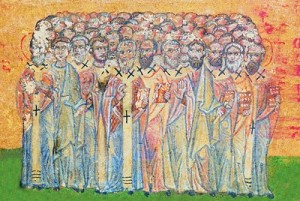I always wonder how Jesus’s disciples were able to minister together. Essenes, sympathizers to the Roman empire, Zealots, country bumpkins-they all had different opinions about politics and religion. I am sure they argued frequently. Jesus called James and John “sons of thunder” because they argued so much. But later on John would become the apostle of love.
It seems to me that at least publicly, on social media that is, there are a lot of denunciations going on. Well, actually, it’s not just on social media. Lots of denunciations are going on period. I know some who’ve been fired from their jobs or forced to resign over peripheral issues. Some are making peripheral issues into central tenets of the faith. They are self-appointed gate keepers. They are able to point out the splinters in everyone else’s eye, but don’t mention the logs in their own.
Not every socio-political or theological issue is a core tenet of Christianity.
Maybe we need to convene representatives from the 30,000 + denominations to figure out what the central tenets of Christianity are even though universal church councils decided on such matters over a 1000 years ago.
Is it possible for us to become like the apostle John? Is it possible for us to change from sons and daughters of thunder to sons and daughters of love amid such strong disagreements?
As I’ve written recently: “Theology is not a litmus test for neighborly love. Jesus did not say, ‘Love only those neighbors with whom you agree theologically.'”
Is it any wonder that many outside the church are put off by our collective witness? We can’t even love one another though Jesus said that others will know we are his disciples because of our love for one another (Jn. 13:35).
I am terribly grieved at our current state. I can only hope for each of us to be reconverted on a daily basis so that we learn how to love one another well. I admit I am still learning. How do I love those who slander friends, my family, or me?
Sometimes love means speaking out. Other times it means remaining quiet. Of course it means forgiving. But forgiveness is easier said than done. Yet each one of us is called to practice forgiveness. It does take practice doesn’t it? And it takes a while.
We are called to love our neighbors and those who oppose us (our enemies).
We are to love God.
We are to love our neighbors.
But how can we claim to love God who we do not see if we don’t love our brothers and sisters that we do see (1 Jn. 4:20)?
Or as the New Living Translation puts it:
If someone says, “I love God,” but hates a Christian brother or sister, that person is a liar; for if we don’t love people we can see, how can we love God, whom we cannot see (I Jn. 4:20)?
I Jn. 4:20 is a two-edged sword cutting straight into the heart of who we really are.
I think it would be good for each one of us to reflect on what it means practically to love one another and then ask God for the grace to do so.

Nice piece. Reminds me of the Irish Catholic /Protestant wars, Spanish inquisition, attacks on Colonial Baptists. I have a lot of friends who are gay Christians and Christian organized Labor members. It is common practice to unite factions by creating an incident and building fear of another target.